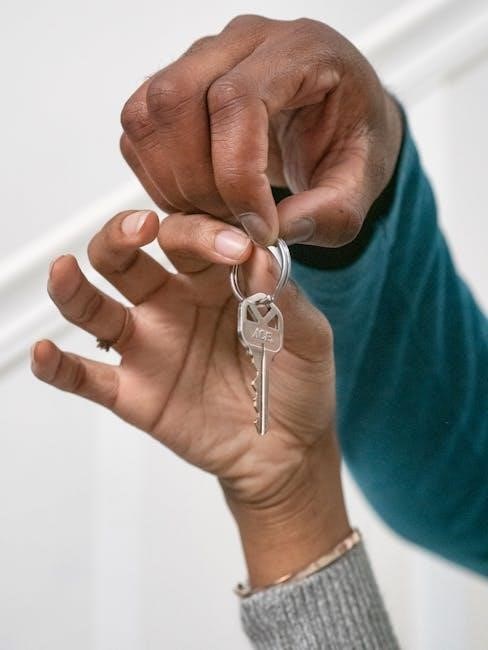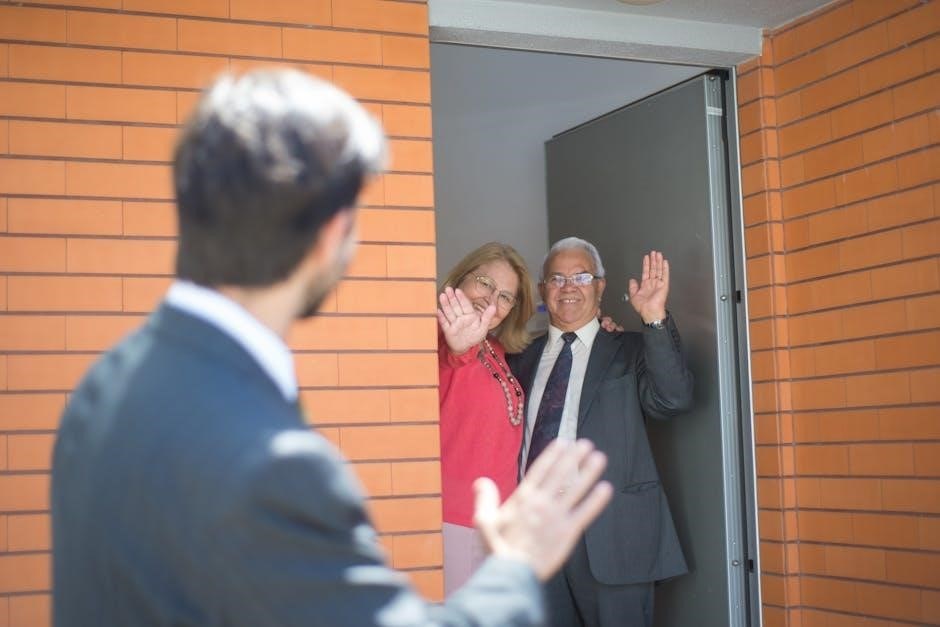The Maryland Homeowners Association Act governs HOAs, ensuring transparency, fair governance, and protection of property values. It outlines legal obligations, rights, and responsibilities for both homeowners and associations.
1.1 Overview of the Act
The Maryland Homeowners Association Act provides a legal framework governing HOAs, ensuring they operate transparently and fairly. It applies to various types of communities, including condominiums and subdivisions. The Act establishes standards for disclosure, governance, and dispute resolution, protecting both homeowners and associations. It aims to balance property value preservation with homeowner rights. Key aspects include financial transparency, meeting requirements, and enforcement of rules. The Act also addresses common issues like architectural controls and fee disputes. By setting clear guidelines, it helps maintain harmonious community living while safeguarding individual interests. Compliance with the Act is essential for both HOAs and residents.

1.2 Purpose and Scope
The Maryland Homeowners Association Act is designed to regulate and oversee the operations of homeowners associations (HOAs) within the state. Its primary purpose is to ensure fair and transparent governance, protecting the rights of homeowners while maintaining community standards. The Act applies to all HOAs, regardless of size or type, and addresses key areas such as financial disclosure, meeting requirements, and rule enforcement. It aims to balance the authority of HOAs with the rights of residents, fostering a harmonious living environment. By establishing clear guidelines, the Act promotes accountability and consistency in community management.
1.3 Importance for Homeowners
The Maryland Homeowners Association Act is vital for homeowners as it ensures transparency and fairness in HOA operations. It protects homeowners by requiring clear disclosures about fees, rules, and financial practices. The Act also guarantees homeowners’ rights to participate in decision-making processes and provides recourse against unfair or abusive practices. By establishing these protections, the Act helps maintain property values and fosters a positive living environment. Homeowners can rely on the Act to hold their HOA accountable and ensure their interests are represented, making it an essential framework for community governance and homeowner rights.

Key Provisions of the Maryland Homeowners Association Act
The Act mandates transparency, fairness, and accountability in HOA operations, including disclosure requirements, governance standards, and enforcement of rules. It ensures balanced rights for all parties involved.
2.1 Disclosure Requirements
Under the Maryland Homeowners Association Act, HOAs must provide detailed disclosures to homeowners and buyers. This includes financial reports, meeting minutes, and governing documents. The Act ensures transparency by requiring HOAs to disclose fees, assessments, and any liens. Homeowners must receive accurate information during property resale, enabling informed decisions. Annual updates and clear communication are mandated to maintain trust and compliance. These requirements help prevent disputes and ensure all stakeholders are well-informed about community operations and financial standings.
2.2 Governance and Transparency
The Maryland Homeowners Association Act mandates transparent governance practices; HOAs must conduct open meetings, allowing homeowner participation, and maintain detailed records of decisions. Board members are required to act in the best interest of the community, avoiding conflicts of interest. The Act also ensures that financial operations are openly disclosed, including budgets and expenditures. Transparency measures foster trust and accountability, enabling homeowners to stay informed about governance activities. By adhering to these provisions, HOAs promote fair and responsible management of community affairs. This section emphasizes the importance of openness in all aspects of HOA operations to protect homeowner rights and maintain community harmony.
2.3 Rules and Regulations Enforcement
The Maryland Homeowners Association Act establishes guidelines for enforcing community rules and regulations. HOAs must ensure that all enforcement actions are fair, consistent, and in accordance with the law. This includes providing clear notice of violations and offering homeowners the opportunity to address issues before penalties are imposed. The Act also outlines specific processes for resolving disputes related to rule enforcement. By adhering to these standards, HOAs can maintain community standards while respecting the rights of homeowners. Proper enforcement helps preserve property values and promote a harmonious living environment for all residents.

Homeowner Rights Under the Act
The Maryland Homeowners Association Act ensures homeowners have access to governing documents, meeting notices, and the right to participate in decisions affecting their community.
3.1 Disclosure Rights
Homeowners in Maryland have the right to access governing documents, meeting minutes, and financial records under the Act. They are entitled to receive a resale package, including the HOA’s governing documents, financial statements, and meeting notices. This ensures transparency and informed decision-making. Homeowners must also be provided with annual financial reports, detailing the HOA’s income, expenses, and reserve funds. These disclosure rights protect homeowners by ensuring they are fully informed about the management and financial status of their community.
3.2 Right to Participate in Governance
Homeowners in Maryland have the right to actively participate in the governance of their HOA. This includes attending meetings, voting on matters affecting the community, and standing for election to the HOA board. The Act ensures that homeowners receive proper notice of meetings and elections, allowing them to voice their opinions and influence decisions. Additionally, the use of proxies is permitted, enabling homeowners who cannot attend meetings to still participate in the decision-making process. This right fosters a more collaborative and democratic community environment, ensuring that all members have a say in how their neighborhood is managed.
3.3 Protection Against Unfair Practices
The Maryland Homeowners Association Act safeguards homeowners from unfair practices by HOAs. It prohibits arbitrary enforcement of rules and ensures that homeowners receive due process in disputes. Homeowners are protected against unjust fines, liens, or foreclosure actions, and must be provided with clear violations notices. The Act also restricts excessive fee increases and mandates transparent financial practices. Additionally, it addresses issues like bans on eco-friendly gardens, ensuring HOAs cannot impose unreasonable restrictions. These protections aim to balance community standards with individual rights, fostering a fair and equitable living environment for all residents.

Homeowners Association Governance
The Maryland Homeowners Association Act requires HOAs to maintain transparency in meetings, records, and financial dealings, ensuring fair and accountable governance for all community members.
4.1 Meeting Requirements
The Maryland Homeowners Association Act mandates that HOAs hold regular meetings to ensure transparency and accountability. These meetings must be conducted in accordance with the association’s bylaws. Proper notice, including the time, place, and agenda, must be provided to all members in advance. Members are entitled to attend and participate in discussions. The act also outlines quorum requirements to ensure decisions are made fairly. Minutes of these meetings must be recorded and made available to members upon request, promoting openness and ensuring all actions are documented for accountability.
4.2 Financial Transparency
The Maryland Homeowners Association Act emphasizes the importance of financial transparency within HOAs. Associations are required to maintain detailed financial records, including budgets, expense reports, and reserve studies. These documents must be made available to members upon request, ensuring accountability and trust. Regular financial audits are mandated to prevent misuse of funds. Homeowners have the right to review the association’s financial statements, fostering transparency and ensuring that fees and assessments are used appropriately for the benefit of the community.

4.3 Conflict Resolution Mechanisms
The Maryland Homeowners Association Act provides mechanisms for resolving disputes between homeowners and HOAs. It mandates fair and transparent processes, ensuring homeowners receive proper notifications and opportunities to address issues. Homeowners have the right to present evidence and cross-examine witnesses during hearings. The Act also outlines procedures for enforcing rules and regulations, balancing community standards with individual rights. These mechanisms aim to resolve conflicts amicably, reducing the need for legal intervention while maintaining harmony within the community. Compliance with these guidelines ensures fair treatment for all parties involved.

Legal Disputes and the Maryland Homeowners Association Act
Legal disputes under the Act often arise from enforcement of rules or financial matters. Homeowners and HOAs must follow due process, with clear guidelines for resolving conflicts and addressing violations. The Act ensures fair treatment and provides legal recourse for both parties, maintaining community harmony and upholding property rights. Disputes are typically handled through hearings, allowing homeowners to present evidence and challenge decisions. This framework promotes transparency and accountability, ensuring that all actions align with Maryland state law and protect the interests of all community members effectively.
5.1 Handling Disputes Between Homeowners and HOAs
Disputes between homeowners and HOAs in Maryland are addressed through structured mechanisms to ensure fairness and transparency. The Act mandates that HOAs provide homeowners with due process, including notice of violations and an opportunity to be heard. Homeowners can present evidence and challenge decisions during hearings, ensuring their rights are protected. The Act also emphasizes the importance of resolving conflicts amicably to maintain community harmony. By adhering to these guidelines, both parties can address issues effectively, fostering a balanced and respectful relationship within the community. This approach ensures that disputes are resolved in accordance with Maryland state law and community standards.
5.2 Role of Legal Recourse
The Maryland Homeowners Association Act provides legal recourse for resolving disputes, ensuring homeowners and HOAs can seek justice through formal channels. Homeowners can file lawsuits for violations of the Act or unfair practices, with courts interpreting the law to protect rights. Legal recourse includes seeking injunctions, damages, or declaratory relief, ensuring accountability and fairness. The Act also outlines procedural requirements, such as providing notice and opportunities for resolution before escalating disputes. Legal action is a critical safeguard, ensuring compliance with the law and maintaining balance in homeowner-HOA relationships. This legal framework supports equitable outcomes for all parties involved.
5.3 Common Issues in HOA-Related Litigation
Common issues in HOA-related litigation often involve disputes over rule enforcement, architectural restrictions, and financial transparency. Homeowners may challenge HOA decisions, such as bans on vegetable gardens or eco-friendly practices, arguing they are unreasonable. Fines and penalties imposed by HOAs for alleged violations frequently lead to legal battles. Additionally, conflicts arise over interpretations of governing documents, with homeowners claiming HOAs overstep their authority. Litigation also addresses issues like proxy use in elections and disclosure requirements. These disputes highlight the need for clear guidelines and fair processes to balance HOA authority with homeowner rights, ensuring harmony within the community.

Amendments and Updates to the Act
The Maryland Homeowners Association Act has undergone updates to enhance transparency, accountability, and homeowner protections, ensuring HOAs operate fairly and in compliance with evolving community needs.
6.1 Recent Changes
Recent updates to the Maryland Homeowners Association Act include stricter disclosure requirements and enhanced protections for homeowners. These changes aim to improve financial transparency and ensure fair governance practices. Additionally, amendments have been made to streamline dispute resolution processes, providing clearer guidelines for conflict resolution between homeowners and HOAs. These updates reflect a commitment to maintaining balance between association authority and homeowner rights, ensuring communities operate harmoniously under updated legal frameworks.
6.2 Impact of Updates on Homeowners
Recent updates to the Maryland Homeowners Association Act have significantly impacted homeowners by enhancing transparency and fairness. Homeowners now benefit from stricter disclosure requirements, ensuring they receive timely and detailed financial records and meeting minutes. These changes also provide clearer guidelines for dispute resolution, reducing potential conflicts and promoting a more collaborative community environment. Additionally, updates have strengthened protections against unfair practices, giving homeowners greater confidence in their rights and the governance of their associations. These modifications aim to balance homeowner freedoms with community standards, fostering a more equitable living experience.
6.3 Future Trends in HOA Legislation

Future trends in HOA legislation are expected to focus on enhancing homeowner protections and modernizing governance practices. Upcoming updates may address emerging issues such as short-term rental regulations, environmental sustainability standards, and privacy concerns related to smart home technologies. There is also a growing emphasis on incorporating digital tools for improved communication and transparency within HOAs. Additionally, lawmakers may prioritize clarifying rules on exterior modifications, such as solar panels or electric vehicle charging stations, to balance property rights with community aesthetics. These changes aim to adapt HOA laws to the evolving needs of homeowners and communities.

Best Practices for Compliance
Homeowners and HOAs should stay informed about legal updates, review governing documents, ensure transparent communication, and adhere to financial disclosure requirements to maintain full compliance.
7.1 Understanding HOA Documents
Understanding HOA documents is crucial for compliance. These documents include CC&Rs, bylaws, and rules, outlining governance, fees, and member rights. Regularly reviewing them ensures awareness of obligations and changes, helping homeowners and boards operate within legal frameworks. Proper document management also aids in resolving disputes and maintaining community standards. Staying informed about updates ensures that all parties adhere to the Maryland Homeowners Association Act requirements, fostering a harmonious and legally compliant community environment. Clear understanding promotes transparency and accountability, essential for effective HOA governance.
7.2 Maintaining Open Communication
Maintaining open communication is vital for effective HOA governance. Regular meetings, transparent notifications, and accessible channels for feedback ensure homeowners stay informed. Clear dialogue fosters trust and collaboration, reducing misunderstandings. HOAs should provide updates on financial matters, rule changes, and community projects. Encouraging homeowner participation in discussions and decisions strengthens community engagement. Open communication also aids in resolving disputes promptly, ensuring issues are addressed fairly. By prioritizing transparency and accessibility, HOAs can build a more inclusive and harmonious living environment for all residents, aligning with the principles of the Maryland Homeowners Association Act.
7.3 Seeking Legal Advice
Seeking legal advice is crucial for both homeowners and HOAs to navigate the Maryland Homeowners Association Act effectively. Legal experts can provide guidance on interpreting the Act, understanding rights, and resolving disputes. Homeowners may need advice when facing issues like unfair enforcement of rules or disclosure violations. Similarly, HOAs should consult legal professionals to ensure compliance with governance and financial transparency requirements. Legal advice helps prevent misunderstandings and ensures that all actions align with state laws. It is a proactive step to protect interests and maintain harmony within the community, fostering a fair and legally sound environment for all parties involved.
